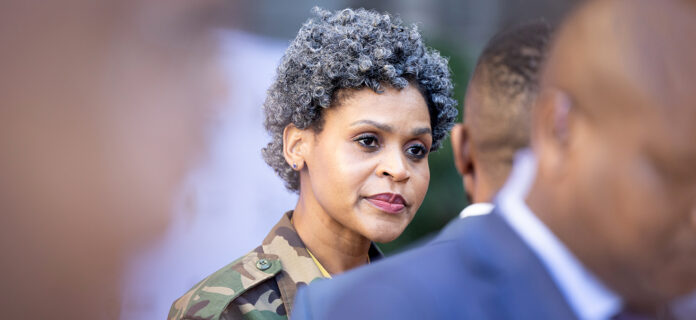Newly appointed MK Party chief whip Colleen Makhubele’s baptism of fire is to ensure the tabling of the motion of no confidence in President Cyril Ramaphosa.
That task was on the desk of his predecessor, Mzwanele Manyi, who was removed from the position on Wednesday. Now, Makhubele will have to file it through parliamentary processes this coming week.
This after National Assembly speaker Thoko Didiza said the motion of no confidence had not reached her table yet.
The MKP announced eight days ago that it was moving to table the motion against Ramaphosa for dereliction of duty, failed leadership and betrayal of the poor and working class.
The MKP’s mouthpiece, Nhlamulo Ndlhela, explained that the party would also request that the no-confidence motion be conducted through a secret ballot.
Didiza told Sunday World Engage this week that there was no guarantee that the motion would be approved.
“If you meet what the rules say, you are granted the opportunity for debate. But it does not mean if I want to have a motion of no confidence, I will get it. It is not guaranteed, because other members might differ, and say they do not think there is a need for a motion of no confidence, and it goes to a vote and a majority vote against it, so you have not won it,” said Didiza.
But Ndlhela said the MKP had a multi-pronged strategy in their pursuit of Ramaphosa.
Quizzed on how the party hoped the motion would succeed when they lacked the necessary numbers to see it pass, he said the political strategy was far bigger than winning the vote itself.
“They will probably say no to a secret ballot, but what then happens is that we will be exposing the cabalism so that people see for themselves,” said Ndhlela.
“Second, a vote of no confidence in the president is itself an indictment of his leadership. And the more you do it, you eat into his image piecemeal.”
As a starting point, though, the MKP will seek to align the forces within the Progressive Caucus alliance, which includes the EFF and ATM.
But should the secret ballot request be granted, Ndlhela said Ramaphosa would fall without a doubt.
According to MKP’s calculations, at least 70% of Ramaphosa’s own ANC caucus are aggrieved by the status quo and will only vote to maintain it if it is an open vote to toe the party line.
Said Ndhlela: “If we are to have a secret ballot, Cyril (Ramaphosa) is gone. If he is confident in his leadership and his GNU forces are confident, let us go to a secret ballot. He would not survive a secret ballot. Within his party (ANC) they do not want him. If the secret ballot is allowed, 60% to 65% of the ANC caucus will vote with us.”
However, Ndhlela’s permutations might not be as straightforward as he thinks because the anti-GNU faction within the ANC appears to have given up all hope of forming an alliance with the MKP and EFF to force Ramaphosa out and collapse the DA from the GNU.
This, despite the ANC caucus rebellion reaching a boiling point during a chaotic meeting with Luthuli House head honchos, where many ANC MPs expressed their wish for the DA to be expelled from the GNU.
After the meeting where Luthuli House doused the fires, there was a strong push for a special NEC meeting to discuss the contentious issue. Those attempts fell flat, with only the ordinary NEC meeting taking place later this month.
The push was advanced by elements in the ANC leadership structures who believe the glue keeping the DA-ANC alliance together is Ramaphosa.
But this bloc has since given up, saying MKP and EFF cannot be relied upon, especially after blowing the opportunity to capitalise on DA’s weaknesses during the national budget 2.0 fiasco.
This is when many believe the DA had effectively kicked itself out of the GNU, but the MKP and EFF voted with the DA against the VAT increase.



